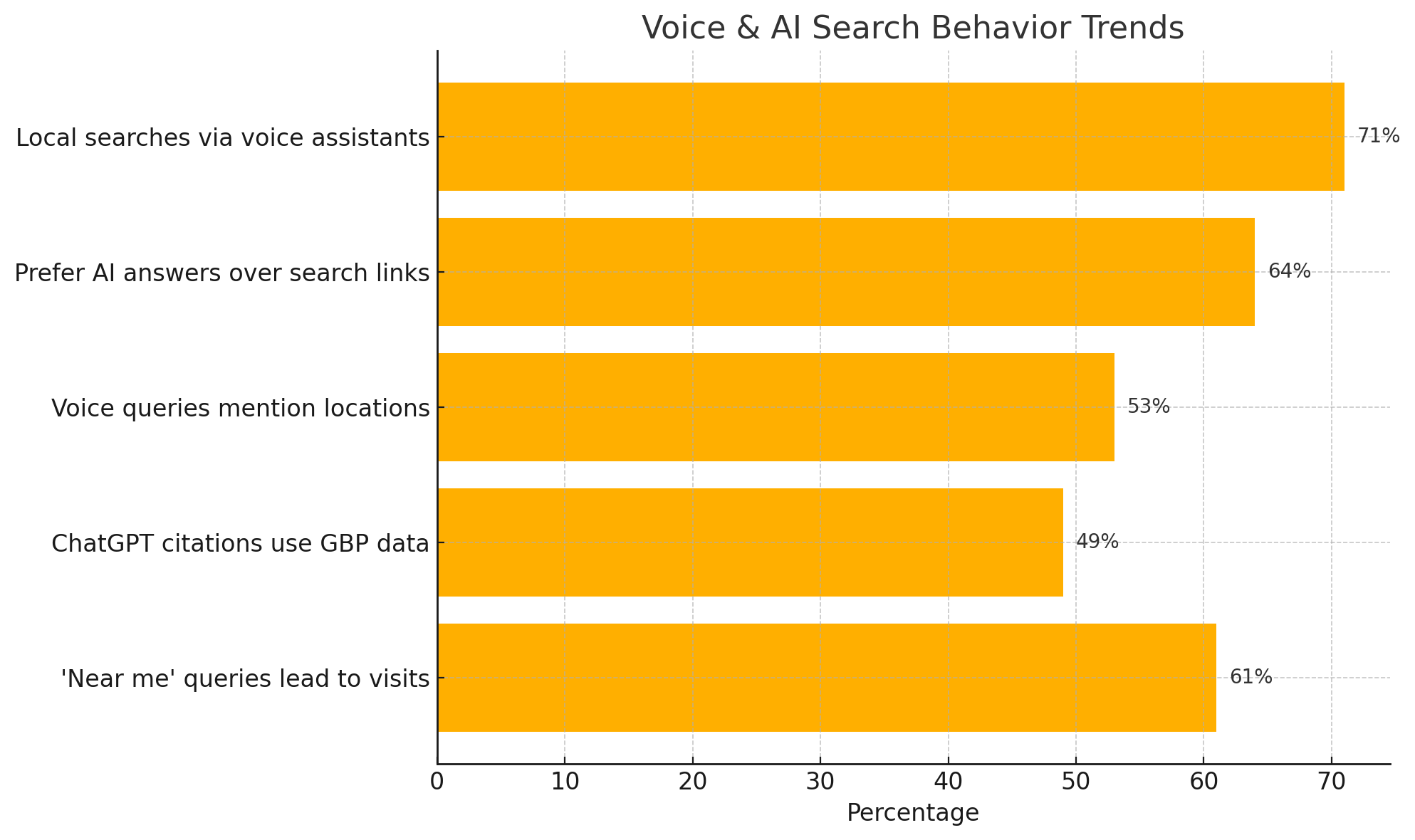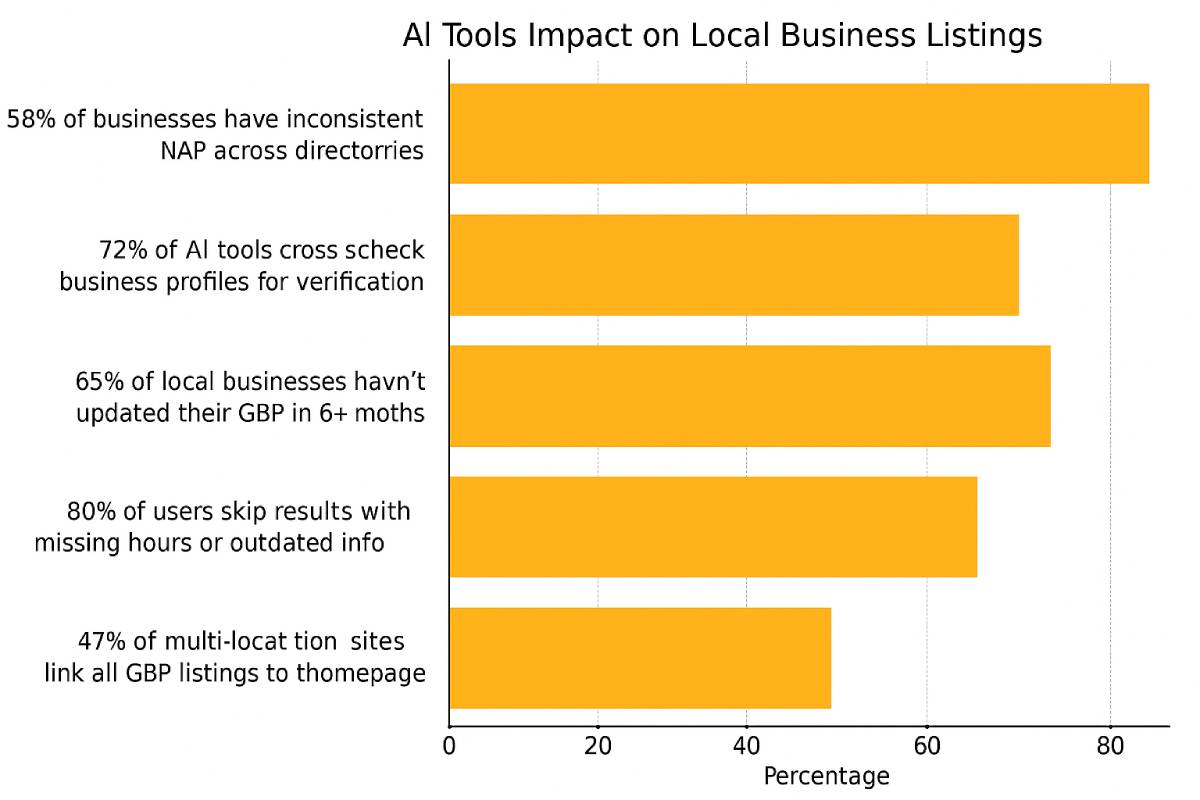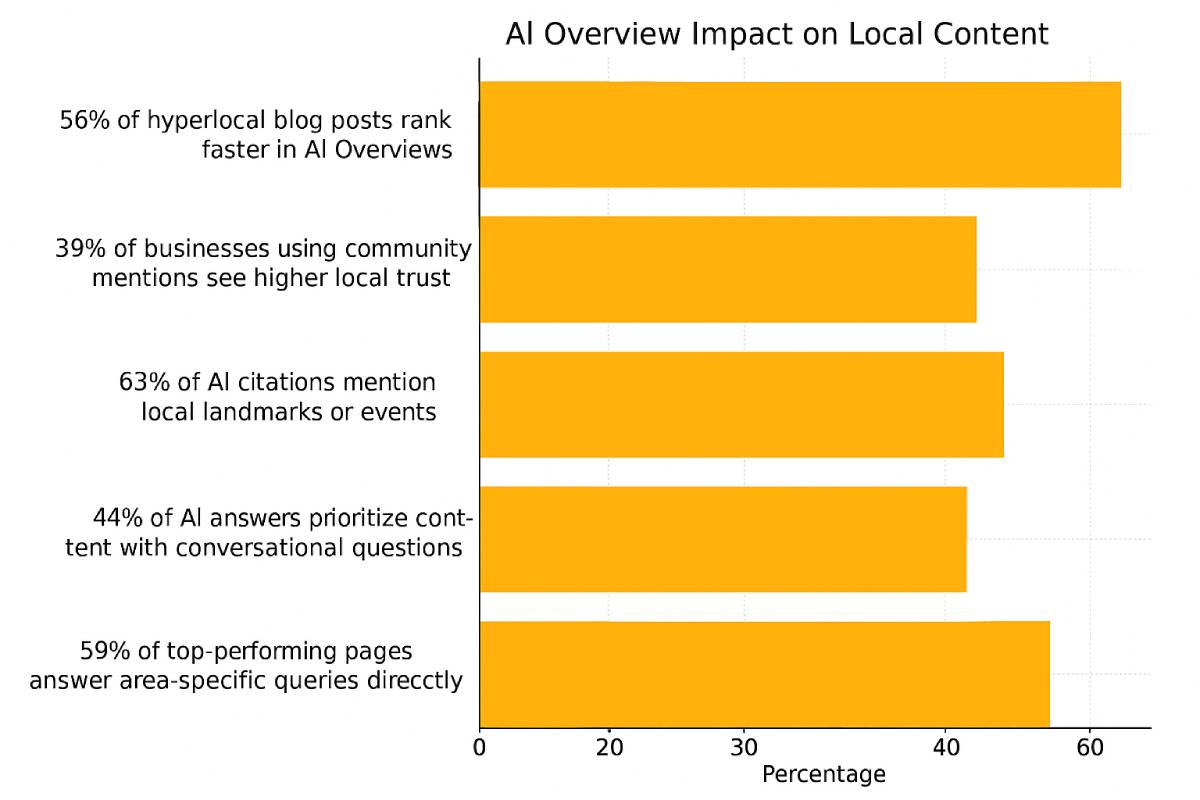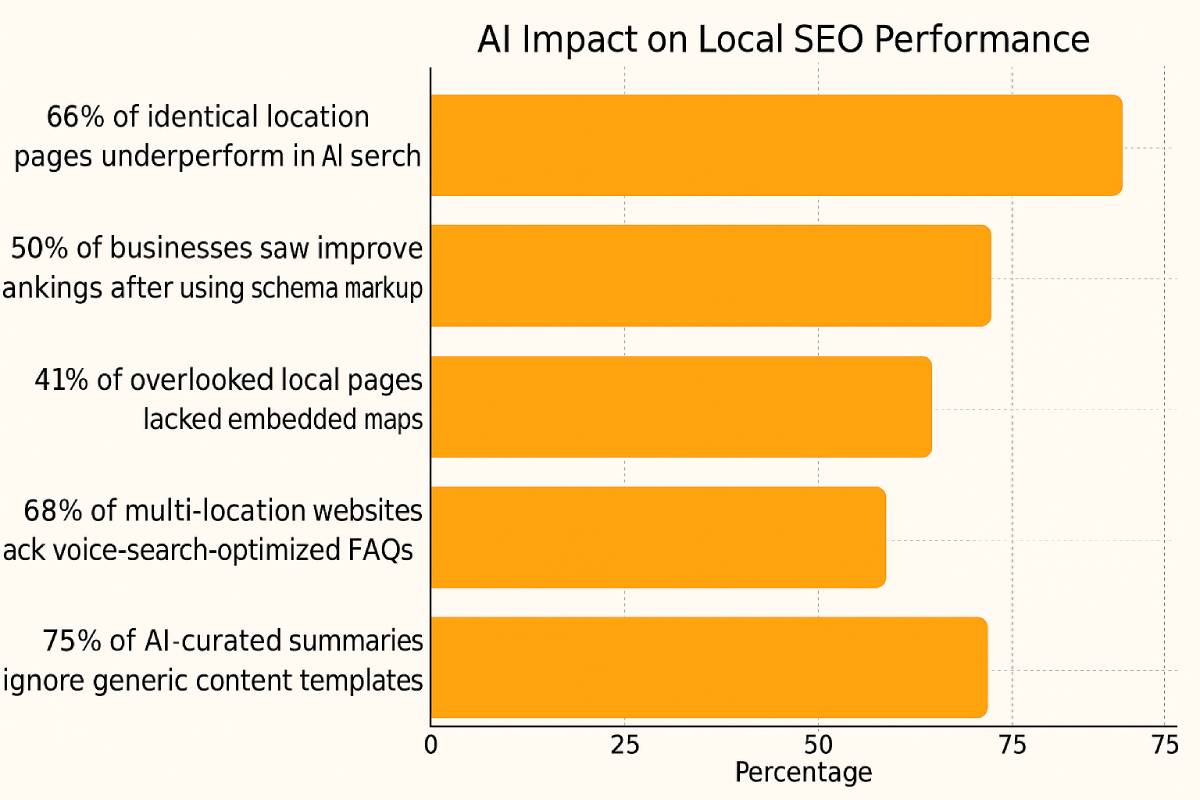
How to Optimize Your Multi-Location Website for Google, Voice Search & AI
If you're managing a business with more than one location, the old SEO playbook isn’t enough anymore. You’re not just trying to rank on Google Maps you’re competing for attention from voice assistants, AI-powered summaries, and customers asking ChatGPT, “What’s the best near me?”
This is about showing up when people speak, not just when they search.
In this guide, we’re breaking down what really works in 2025 for multi-location websites how to optimize for Google, dominate voice search, and become the go-to choice in AI-driven results.
Table of Contents
Key Takeaways: What Every Multi-Location Business Needs to Know
Local Pages vs. One-Size-Fits-All: What Works Best for AI Visibility?
How to Structure Location Pages for SearchGPT and AI Overviews
Consistent NAP & Local Citations: Still Critical in an AI World
FAQs: What Business Owners Ask About Multi-Location SEO & AI
Summary: Local Relevance + AI Readiness = Long-Term Visibility
Key Takeaways: What Every Multi-Location Business Needs to Know
-
AI discovery is hyperlocal and context-aware you must tailor pages for each location.
-
Voice search optimization isn’t optional anymore it’s the new default.
-
Google Business Profiles must be synced and updated per location.
-
Structured, human-friendly content is more important than ever.
Local Pages vs. One-Size-Fits-All: What Works Best for AI Visibility?
Having one general location page doesn’t cut it. Each branch of your business deserves its own optimized space. Why? Because AI systems and voice searches prefer clarity.
Instead of vague listings, your site should provide:
-
A dedicated page for each location
-
Specific services offered at that location
-
Clear local contact details and map embed
Voice assistants and Google’s AI Overviews are far more likely to surface your brand when content is tailored this way.
Voice Search Optimization for Multiple Locations
Most “near me” queries today come through voice. People are asking:
-
“Where can I get same-day flower delivery in Etobicoke?”
-
“Best Vietnamese food near Kennedy and Sheppard?”
To capture this traffic, your content needs to reflect how people speak. That means:
-
Using natural phrasing and questions in your headings and answers
-
Including FAQ sections with real customer-style language
-
Embedding location-specific keywords in conversational formats
The more your site sounds like the user’s query, the better chance you have of being the answer.

The Role of Google Business Profiles for Each Location
Even with a fully optimized website, neglecting your Google Business Profiles (GBPs) is a major misstep. AI tools like Google's Gemini use GBP data to confirm legitimacy and location relevance.
Make sure each profile includes:
-
Accurate NAP (Name, Address, Phone)
-
Updated hours and services
-
Real photos of the location
-
Actively managed reviews and Q&A
Each GBP should link directly to the corresponding landing page on your website.
Want your North York locations to show up in voice searches like “best plumber near me”?
Let Unlimited Exposure help you optimize each branch with structured content, updated profiles, and AI-ready FAQs.
How to Structure Location Pages for SearchGPT and AI Overviews
Your structure matters. Why? Because AI parses your layout to extract relevant information fast.
An ideal structure includes:
-
A clear H1 with the location name
-
Subheadings that address common local questions
-
Embedded maps and driving directions
-
Schema markup that defines the page as a local business
The layout should feel clean, answer-focused, and easy for both users and machines to scan.

Consistent NAP & Local Citations: Still Critical in an AI World
Yes, even in the age of AI, consistency still matters. Discrepancies in your business name, address, or phone number across the web create confusion not just for customers but for algorithms.
Audit your listings on:
-
Industry directories and local blogs
Then align all of them with your current GBP data and website.
Building Trust Signals for Each Location
Trust is currency in AI and voice search. You need to give AI models confidence in recommending you.
Every location should feature:
-
Recent, authentic reviews
-
On-page testimonials or local case studies
-
Staff bios or photos that humanize the business
-
Links to local partnerships or sponsorships (if applicable)
This human context helps both AI and customers feel secure in choosing your brand.

Creating Hyperlocal Content That Feeds AI Answers
Want to rank in SearchGPT or Google AI Overview? You need content that matches local intent.
That could include:
-
Blog posts about events or topics in that area
-
Answering specific local questions: "Where to get eco-friendly dry cleaning in North York?"
-
“Top 5” or “Best of” listicles tied to your service and region
Hyperlocal content helps your page be selected for answers not just indexed.
If you’re a business in Toronto or Scarborough and your location pages are copy-paste clones... we need to talk.
Our team builds AI-optimized, hyperlocal pages that actually get cited in tools like ChatGPT, Perplexity, and Google Overviews.
How AI Tools Choose Which Location to Recommend
AI doesn’t just look for proximity it looks for:
-
Consistent branding across web properties
-
Reviews with keywords like the service and location
-
Pages with specific, structured content that matches the query
When all those elements align, your location becomes the logical answer for tools like SearchGPT and Google Assistant.
Multi-Location Website Mistakes That Hurt Your Rankings
Avoid these common errors:
-
Copy-pasting content across location pages
-
Linking every GBP to the homepage instead of the local page
-
Missing schema markup for local business data
-
Forgetting to monitor or respond to reviews per location
One lazy template can hurt 10 locations. Don’t do it.

Tools & Tactics: What You Can Do Today Without a Developer
Even if you’re not technical, you can make a big difference. Start by:
-
Updating all your GBP listings to reflect accurate services and hours
-
Rewriting one underperforming location page to include structured headings and FAQs
-
Adding localized callouts like “serving Thornhill since 2009”
-
Embedding a Google Map for each location
These simple steps give your site instant lift.
Additional Resources:
- How SearchGPT is Rewriting Local SEO for Voice: Your Business Playbook
- Ranking on SearchGPT: Your Step-by-Step Guide to AI Search Success
- Answer Engine Optimization (AEO): Your Essential Guide to Being THE Answer Online
- What Google’s AI Shift Really Means for Your Marketing (And What to Do Now)
FAQs: What Business Owners Ask About Multi-Location SEO & AI
Q1: Should each location have its own page, or can I list them all on one?
Each location should absolutely have its own page. That’s how Google, Siri, and ChatGPT know which one to recommend based on a user’s location or query.
Q2: What’s the best way to show up in “near me” voice searches?
Use natural language on your pages and FAQs. Phrases like “Looking for dental implants in Scarborough?” match how people speak and how voice assistants listen.
Q3: Do I need a separate Google Business Profile for every location?
Yes. Each physical location should have its own GBP, fully completed, verified, and tied to its corresponding page.
Q4: Can reviews impact my local visibility across all platforms?
Absolutely. AI and Google both pull signals from reviews especially when those reviews mention your service, city, or neighborhood by name.
Q5: What if I don’t have the budget to build 10 perfect pages?
Start with your top-performing or highest-priority locations. Build those pages properly, then scale using that template. It’s about progress, not perfection.
Q6: How do I know if my content is working in AI tools like SearchGPT?
Use tools like Bing Webmaster Tools and Google Search Console to track which pages are being surfaced. Also, test prompts in ChatGPT and Perplexity to see which of your pages are cited.
Q7: Is structured data really necessary for local pages?
Yes. Schema markup helps AI tools understand your business type, hours, and location faster than crawling content. It gives you an edge.
Trying to dominate the GTA but lost in Google Maps results?
Whether you're in Thornhill, Ajax, or North York, Unlimited Exposure can optimize your entire multi-location footprint, no dev team required, Let’s talk.
Summary: Local Relevance + AI Readiness = Long-Term Visibility
Multi-location SEO in 2025 isn’t just about Google it’s about being present wherever your customers ask for you. That means optimizing for voice, for AI, for relevance, and for trust.
Whether someone’s typing “best HVAC in Whitby” or asking Alexa for “family dentist near me,” your business should show up with clarity, credibility, and confidence.
Start optimizing smartly because AI isn’t the future of search. It’s the present.
About UnlimitedExposure.com - Affordable Web Development & Digital Marketing Agency in North York
At Unlimited Exposure, we’ve been helping Toronto businesses grow online for over 25 years. Whether you're running a chain of restaurants, clinics, service centers, or storefronts, we specialize in building AI-optimized, voice-search-friendly multi-location websites that rank on Google and convert real customers.
We’re not just another agency we’re your local growth partner. If you’re searching for a “local SEO company near me” or an affordable web development team in North York, you're in the right place. Our strategies are built for today’s search landscape: Google, voice assistants, and AI engines like ChatGPT.
Services for Multi-Location & Local Businesses in the GTA
Looking to grow your business across multiple cities or neighborhoods? We offer SEO and marketing services that help you show up in “near me” voice searches, AI recommendations, and map results without the corporate jargon or overpriced fluff.
Our core services include:
-
Local SEO & Google Business Profile Optimization for each of your locations
-
AI & Voice Search Content Strategy to get cited by ChatGPT and Google AI
-
Affordable Web Development that’s mobile-friendly, fast, and SEO-ready
-
Paid Advertising Campaigns on Google, Facebook, Instagram, and TikTok
-
Reels & Short-Form Video Production and Management for local engagement
-
Social Media Marketing & Community Management that drives real interactions
-
Influencer Marketing with creators who bring credibility and local reach
-
CRM Selection & Integration tailored to your operations and goals
-
AI Chatbot Integration & Website Automation to streamline lead generation
Serving businesses in North York, Toronto, Scarborough, Richmond Hill, Whitby, Thornhill, Ajax, and across the GTA we help you turn “searchers” into customers, and customers into loyal advocates.
